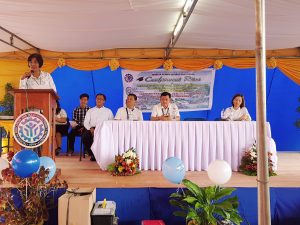
The Isabela School of Arts and Trades (ISAT) in Ilagan City, Isabela awarded certificate of completion to 447 Pantawid Pamilya beneficiaries under DSWD FO2’s Sustainable Livelihood Program (SLP) last February 01, 2018.
The graduates, who come from 16 municipalities across 3 districts in the Province of Isabela, were presented with their certificates for different competencies by the Officer-In-Charge of DSWD FO2, Ms. Lucia S. Alan, along with Technical Education and Skills Development Authority (TESDA) Region II Regional Director, Dante J. Navarro, TESDA Isabela Provincial Director, Romeo O. Talosig, ISAT Vocational School Superintendent, Igmedio S. Casticon and SLP Isabela Provincial Coordinator, Ms. Maricel Balisi.
“It matters not how strait the gate, how charged with punishments the scroll, I am the master of my fate, I am the captain of my soul,” Ms. Alan said in quoting William Ernest Henley to challenge the graduates to use what they have learned in school to better their lives and uplift themselves out of poverty.
All the 447 graduates of the said school were also conferred the National Certificate (NC II) by the TESDA which makes them eligible to work for positions that fit their skills.
“You… have been instrumental in molding us to become globally competitive through proper skills training and development,” Melo Jane L. Somera, one of the graduates said of the agency and the school in her speech during the conferment rites.
Ms. Maricel Balisi said that most of the participants who were conferred with certificates have already started working and the awarding serves as a culmination of their journey towards being eligible to work in areas where their skills can be used.
Ms. Balisi added that the trainings conducted by the program enhances the “employability and profitability” of the participants as they are capacitated with skills that can be used for livelihood purposes.
The program was also used to distribute tool kits which the participants can use for their livelihood endeavors. ### By: Chester Carlo M. Trinidad, OIC-Regional Information Officer

